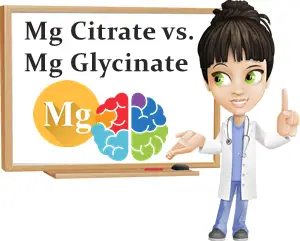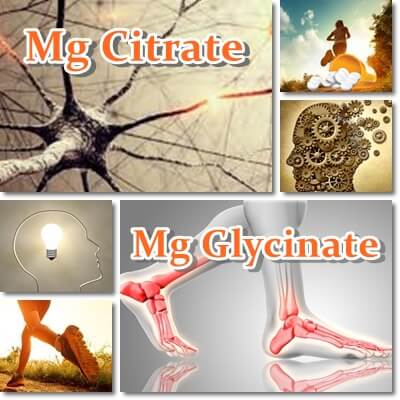Which is better between magnesium citrate and glycinate? For one, neither is the best absorbed magnesium form, or the worst. But it appears that the glycinate form is better absorbed than the citrate form, although exact absorption rates may vary from person to person. This is because the formula has magnesium bound to the amino acid glycine, a compound which favors higher bioavailability and absorption rates, studies say. Versus magnesium citrate which has the mineral bound to citric acid.
The way a dietary supplement is formulated impacts its bioavailability. For magnesium supplements, the active ingredient, which is the mineral magnesium, is bound to different compounds which ultimately dictate how much of it you absorb. Some of the best absorbed forms are those in which the mineral is bound to an organic compound such as an amino acid (magnesium aspartate or glycinate) or an organic acid (magnesium gluconate or citrate).

The glycinate formula has the mineral bound to the amino acid glycine which is simply better absorbed than the citrate formula in which the mineral is bound to citric acid. Glycine is a non-essential amino acid naturally found in pork skin/rind, meat (pork, beef, chicken, turkey, venison), crab, lobster, fish (salmon, lobster), sesame and pumpkin seeds, almonds and peanuts (and the flours made from them), soybeans etc. Citric acid is naturally found in citrus fruit, especially lemons and limes. The amino acid glycine helps the magnesium get absorbed into cells better than citric acid, hence the higher bioavailability of magnesium glycinate versus citrate.
Mg glycinate vs Mg citrate bioavailability
When comparing the bioavailability of magnesium glycinate versus that of magnesium citrate, the glycinate form is superior to the citrate. Even though in both cases, the mineral is bound to an organic compound and has an overall good absorption rate as a result (better than oxide, sulfate or carbonate formulas anyway). The bioavailability of magnesium citrate is good, with an estimated absorption rate of up to 30%. But the bioavailability of magnesium glycinate is said to be even better, which would imply a higher absorption rate, although exact numbers are not specified.

1) Mg citrate
Magnesium citrate is available in tablet and capsule form, as a powder meant for dissolving in water or as a liquid (oral solution). Capsules may be enteric-coated, meaning they only dissolve once they reach the intestines (to ensure an optimal absorption rate). Both tablets and capsules may also be slow-release or extended-release, meaning the active ingredient is released slowly or over the course of several hours – the gradual release of the mineral ups absorption rate.
What is magnesium citrate used for? Magnesium citrate is primarily used as a dietary supplement for correcting a deficiency of the mineral. It basically raises magnesium levels in the blood. This holds benefits for muscles, bones and the nervous system and possibly also blood sugar control in type 2 diabetes. As a dietary supplement, it is most often used for restless leg syndrome and muscle cramps, spasms, twitching, numbness, insomnia, anxiety, stress, high blood pressure, tachycardia (rapid heart rate), palpitations or extrasystoles (missing or skipped heart beats) and even headaches and migraines.
The second most important of its uses is relieving constipation. Because of the way it’s formulated, magnesium citrate works by attracting water into the gut, exerting a laxative effect that encourages the production of a bowel movement in up to 4-6 hours. Another reason for taking magnesium citrate is it helps relieve heartburn caused by acid reflux, although this is not its primary use. Also, effects are dose-dependent.
Dosage is established according to uses. For correcting a magnesium deficiency in adults, doses of 200 mg, 300 mg, 350 mg or 400 mg of magnesium citrate are available (including tablet, capsule or powder form). For other uses, such as relieving constipation, doses may vary and are best established by a medical professional.
The side effects of magnesium citrate are mainly associated with a too high a intake. The most common side effects are loose stools and diarrhea and associated symptoms in the form of stomach upset, abdominal pain, cramps, maybe bloating. Rarely, there may be allergic reactions. Signs of an allergic reaction include red, itchy, bumpy skin rash, swelling of the tongue or throat, closing of the airways, wheezing, hoarseness and difficulty breathing in general, nausea, low blood pressure, dizziness or fainting up to anaphylactic shock which is a medical emergency.
2) Mg glycinate
Magnesium glycinate is available in tablet, capsule, powder and liquid form. The tablets and capsules can be enteric-coated, slow-release or extended release and come in various doses, depending on what they are meant to be used for. For correcting a deficiency, magnesium glycinate comes in 300 mg and 400 mg doses per tablet/capsule. Liquid formulas come in 16 oz glass bottles and are meant to be taken in doses of up to 300 or 400 mg a day.
Uses for magnesium glycinate include: correcting a deficiency by raising levels of the mineral in the blood, correcting electrolyte imbalances caused by diarrheal diseases, use of diuretics and other factors. For correcting a deficiency, doses of up to 400 mg of magnesium glycinate a day yield good results.
The benefits of taking magnesium glycinate as a dietary supplement:
1) Better sleep, feeling more rested upon waking up (good for insomnia).
2) Improved muscle function – less severe and frequent muscle cramps and spasms (example: nighttime leg cramps, foot or calf cramps after exercise).
3) Reduced fatigue, clarity of mind.
4) Benefits for mental health (good for stress, anxiety, depression).
5) Potential benefits for mood swings.
6) Better blood pressure numbers (works best together with potassium).
7) Benefits for arrhythmia, especially palpitations and extrasystoles (skipped heartbeats).
8) Strong bones and teeth (low blood magnesium levels causes the body to draw out the mineral from the bones, resulting in frail bones that are prone to fractures).
9) Potential benefits for migraines.
10) May help with blood sugar control in type 2 diabetes.
11) Other benefits: maintains electrolyte balance, helps relieve constipation, heartburn and may be good for pregnancy pre-eclampsia and eclampsia.
Side effects of magnesium glycinate are associated with an excessive intake and may include stomach upset, loose stools, diarrhea, abdominal cramps. In rare cases, allergic reactions are possible. Symptoms such as hives, swollen tongue or throat, difficulty breathing, low blood pressure, dizziness, fainting indicate an allergic reaction and require immediate medical attention. If left to progress, symptoms may culminate in anaphylactic shock.
Conclusion
Magnesium citrate or glycinate? Overall, both are good formulas with relatively good absorption rates (30% and higher). Both can successfully be used for correcting a deficiency and provide similar benefits for muscles, bones and the nervous and cardiovascular system. However, the glycinate form is better absorbed than the citrate and, as a result, the favorite of the two. Especially since the latter is also more likely to cause loose stools and diarrhea, a rather unpleasant side effect (and also the reason why Mg citrate is used for preparing for colonoscopy procedures). Nevertheless, if you are severely deficient in magnesium, either one of the two forms is good since a severe deficiency has been observed to result in a higher uptake of the mineral from all formulas.
